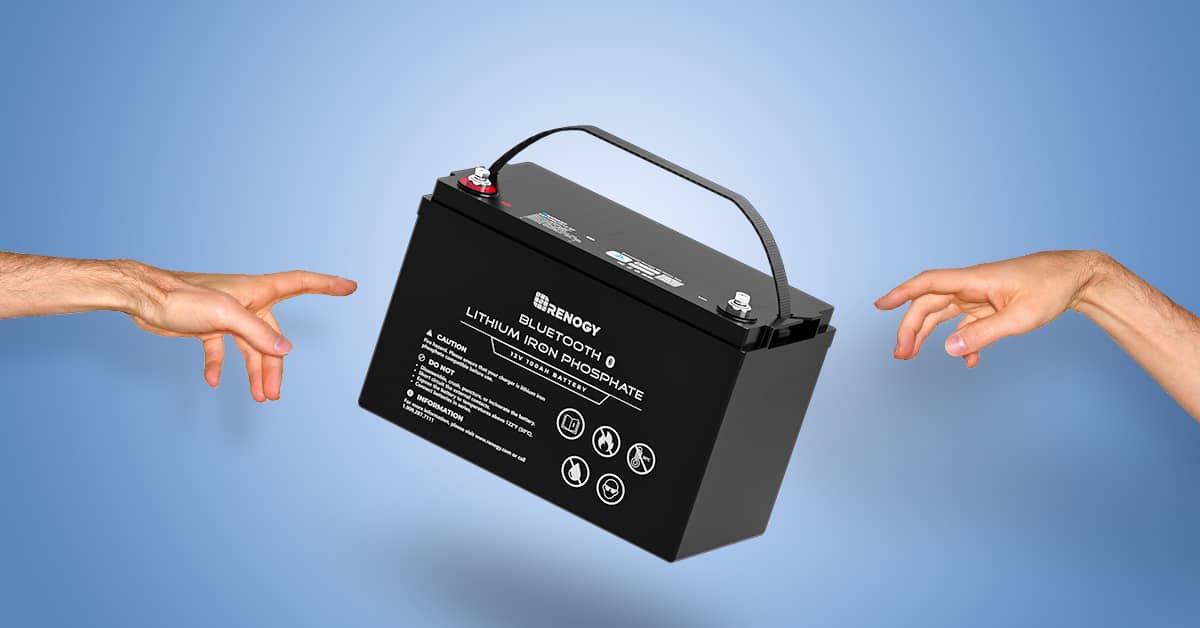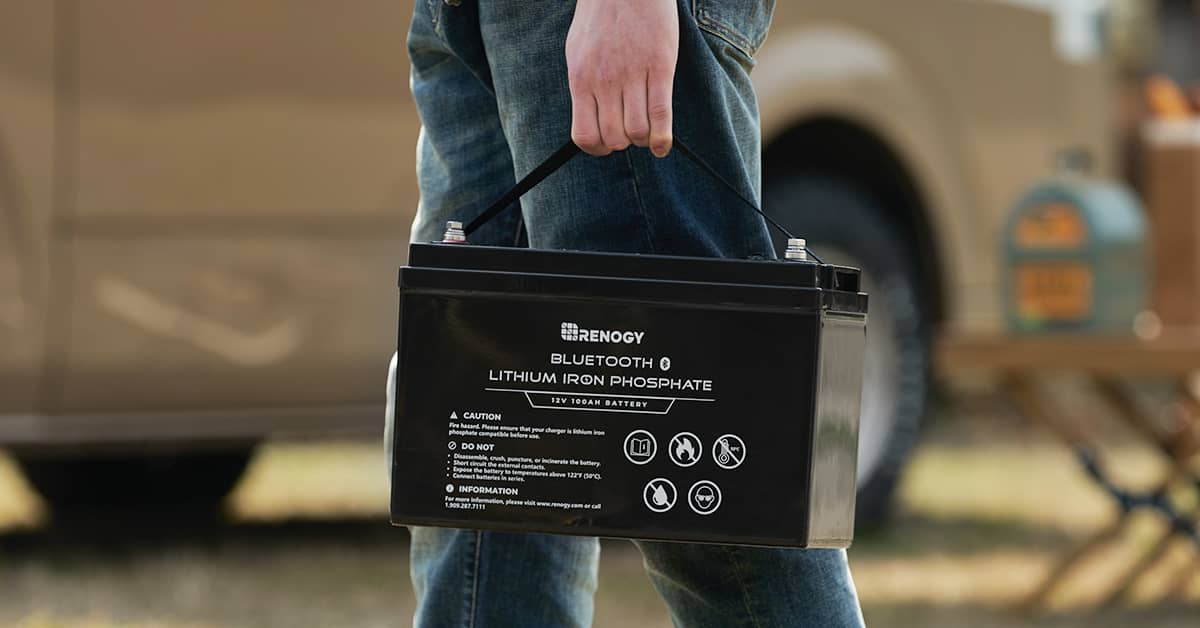Adding battery storage to your solar installation can be a great way to improve your quality life at home or own the road by ensuring you have reliable access to power, saving thousands on monthly utility bills, becoming energy independent, and living a green lifestyle. And like everything else in solar installations, there is a lot to consider when deciding on a solar storage option.
Overview: Solar Power Battery Storage
-
Is battery storage for me?
-
How Much Energy Storage Do You Need?
How to Select battery for solar panel
-
What To Consider When Selecting A Solar Storage Solution?
-
Which deep cycle battery is best for me?
-
Do lithium batteries charge faster than flooded lead acid batteries?
How to Size Solar Panel Batteries
-
How many solar power batteries do I need for my solar system?
-
Is 12V enough for my solar system? What about 24v or 48v?
Deep cycle solar power batteries are the best solution for battery storage. They look similar to car batteries, but are actually very different. In contrast to car batteries which only provide short bursts of energy, deep cycle batteries are designed to provide sustained energy over a longer period of time. Renogy offers a variety of deep cycle batteries for purchase, from flooded lead acid to lithium batteries.
In this guide, we’ll answer big questions around how much energy storage you need, what makes different batteries unique, and what to look for when shopping for batteries for your solar installation.
Is solar panel battery storage suitable for me?
I live in a caravan or motorhome: Yes!
Adding battery storage is a crucial step to creating a powerful off-grid solar system for your mobile lifestyle. Installing solar panels and batteries can take the place of a gas-powered generator, giving you the peace of mind that you’ll be able to meet all your energy needs while on the open road. You’ll also be able to use energy at night or when your panels aren’t generating power.
I live in a home with access to the electrical grid: Battery storage is useful in case of outages.
Battery storage can be a great asset for many homeowners with solar installations. Having a battery bank can give you the ability to run your solar panels and keep your lights on in case of an outage and can also give you the ability to go off-grid.
How much energy storage do you need?
Solar batteries store the energy that is collected from your solar panels. The higher your battery’s capacity, the more solar energy it can store. In order to use batteries as part of your solar installation, you need solar panels, a charge controller, and an inverter.
Properly sizing your battery bank is a crucial step to creating an efficient and powerful system. If your battery bank is undersized, you may not be able to fully meet your energy needs. If your battery bank is oversized, your solar panels may not be able to fully recharge the batteries, which may lead to chronic undercharging, decreased lifespan, and poor performance. Deep cycle batteries can be discharged up to 80%, but most manufacturers recommend not discharging below 45%. Regularly going beyond that point will shorten the life of the solar power battery.
Properly sizing your battery storage is crucial to ensuring you have a long-lasting, safe, and efficient system. In short, we typically recommend calculating your energy needs (the Renogy solar calculator does just that),and then going from there. In this section we talk about the different tools and tips and to use when sizing the solar storage system in your installation.
What To Consider When Selecting A Solar Storage Solution
When shopping for solar power battery storage for your solar installation, there’s a few main options to consider: flooded lead acid, sealed lead acid, and lithium batteries. Considering the price, capacity, voltage, and cycle life of each of those options will help you decide which is the best for you.
Price: Batteries can vary from around $100 for the cheapest lead acid battery to more than $1,500 for a lithium iron battery. Also, be sure to consider the ultimate lifetime and not just upfront costs.
Capacity: Solar panel battery capacity is important because it measures the amount of energy you can store. If you need to power certain appliances for long periods of time, you'll need more batteries to carry a bigger load.
Voltage: Be sure to check the voltage of the battery bank to ensure it is compatible with your panels and the rest of the system, particularly your solar panels. Panels typically come in either 12V and 24V options.
Cycle Life: This specifies the number of discharge and charge cycles a battery can provide before the capacity drops below the rated capacity.
Check out the following posts in this section to learn more about where different technologies rank in the above categories and what makes different batteries unique. Additionally, once you purchase those batteries, how do you install the batteries in your system?
Which deep cycle battery is best for me?
Flooded Lead Acid: Cheapest option, but highest maintenance
Cost: Around $100
Flooded lead acid batteries are the cheapest solar panel battery option, but they also require the most maintenance. You have to check water levels with a hydrometer and add water to keep them topped off each month. Lead batteries must also be housed in a ventilated room since they emit gases. This is not necessary with lithium iron phosphate batteries.
Sealed Lead Acid (Absorbed Glass Matt and Gel): Little maintenance, lower charge rates
Cost: $239-$449
Shop on Renogy for Gel Batteries and AGM Batteries here
Contrary to flooded lead acid batteries, sealed lead acid batteries require little to no maintenance and are spill-proof. They are more expensive than flooded lead acid batteries, but also have a much longer cycle life.
Within the family of sealed lead acid batteries are two types: absorbent glass matt (AGM) and gel batteries.Gel batteries use silica to stiffen the electrolyte solution in the battery, and they tend to have lower charger rates and output than absorbed glass matt batteries. They also can’t handle as much current, meaning they typically take longer to recharge. However, gel batteries have a greater lifespan than AGM batteries and can be mounted in any orientation. Absorbed glass matt batteries offer a better temperature range and are a bit cheaper than gel batteries.
Lithium Iron Phosphate: Expensive, but zero maintenance and long lifespan
Cost: $499-$1499
Shop types of lithium batteries on Renogy
Lithium iron phosphate batteries are the most expensive battery option, but they have many benefits. Lithium iron phosphate batteries have an extremely long cycle life, high discharge and recharge rates, and are incredibly compact and lightweight. They also require little to no maintenance.
Do lithium batteries charge faster than flooded lead acid batteries?
Yes! Lithium iron phosphate batteries are the most efficient battery type and have a faster rate of charge. This is because they can typically handle a higher amperage. This means they can be recharged much faster than sealed and flooded lead acid batteries.
How many batteries do I need for my solar system?
The amount of battery storage you need is based on your energy usage. Energy usage is measured in kilowatt hours. For example, if you need 1,000 watts for 8 hours per day, then your energy usage is 8kWh per day. A battery capacity of 4 to 8 kWh is usually sufficient for an average four-person home.
To size a system that will best fit your needs, we recommend using the Renogy solar panel calculator to help determine your specific needs.
Is 12V enough for my system? What about 24v or 48v?
Systems can be designed to be 12, 24, or 48 volts. Panels, solar panel batteries, and inverters each come with those specifications.
12v systems are suitable for many scenarios, including RVs, vans, camper trailers, or smaller cabins and tiny homes. If your energy needs are around 1,000 to 5,000 watts, we recommend opting for a 24 volt system. If your energy needs are over 3,000 watts, install a 48 volt system. Large off-grid houses often use 48V. If you’re in the middle of those ranges, such as 3,000 watts, there is an advantage of opting for the higher voltage. You’ll need fewer charge controllers and can utilize thinner cables to achieve the same amount of power. This will save you money on costs in the long run.
Can I wire different deep cycle battery types and sizes together?
No. We recommend wiring solar panel batteries
of the same type and amp hour rating, i.e. if you go with absorbed glass matt batteries, all the batteries in your battery bank should be AGM batteries.
Are solar panel batteries safe?
Yes! In general, solar batteries are very safe
. Issues that may arise come if they are installed incorrectly or the battery quality is low. Because of that, it is important to ensure batteries are properly installed, in suitable condition, and purchased from a reputable manufacturer.
For example, Renogy deep cycle solar batteries have a BMS, which stands for Battery Management System. The BMS safely protects the battery from being used/charged during incorrect conditions.
How long will it take to charge a deep cycle battery?
Total charging time depends on the weather, as well as the state and type of your battery bank. If a battery is totally drained, a solar panel can energize the cells within five to eight hours. The position of the sun in the sky can impact a panel’s charging speed. When sunlight shines directly on a panel in the middle of summer, the charging speed will be faster. Charging cycles are slower on cloudy days.
What is the lifespan of deep cycle batteries?
Battery life varies a bit from technology to technology. For example, many gel batteries typically last 1,100 cycles, absorbed glass batteries 600 cycles, and lithium iron phosphate batteries 7,000 cycles. Overall, you can assume your solar batteries will last between 5 and 15 years. Therefore, you may need to replace your batteries at least once within the lifespan of the rest of your solar system.
Closing / recap
As deep cycle batteries continue to improve in efficiency and drop in price, there’s never been a better time to add storage to your system. Solar battery storage is great for those living a mobile lifestyle on the road or remotely in an area without reliable access to the electrical grid. Solar panels and batteries can take the place of a noisy and dirty gas-powered generator. Additionally if you’d like to be able to run your solar panels in case of grid outages, battery storage is a great way to ensure continued energy access.
Renogy has a range of deep cycle batteries available for purchase, including the highly efficient but expensive 12v lithium batteries and sealed lead acid batteries, which are more efficient than flooded lead acid batteries and cheaper than lithium iron phosphate batteries. Although many people focus on the performance of solar panels when planning a solar installation, one cannot afford to forget to take the time to weigh the different battery options available to you. By considering the elements above you should be well equipped to start storing all that energy collected from your solar panels in no time.
See other related articles at Renogy:
A Guide to Installing Solar Panels On Van Or RV
Solar Panels 101: A Beginner's Guide
The Ultimate Guide To DIY Off-Grid Solar Systems
Do solar panels increase home value
How efficient are solar panels
How Many Solar Panels Do I Need








